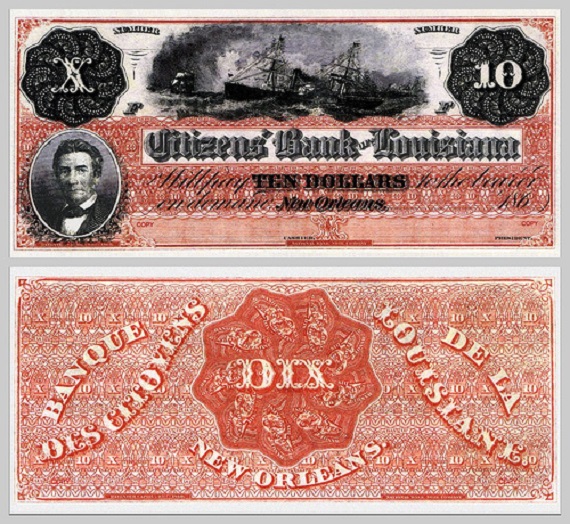While cleaning my study the other day I ran across my copy of a $10.00 “Dix” note. This paper money was issued by the Bank of New Orleans up to 1860. Looking at my copy of the “Dix” note cause me to reflect on the disastrous changes that have occurred in the Southern economy since the days of that quaint little “Dix” note.
Early in the 1800s when men from “up-river” would float their wares down the Mississippi River to New Orleans they would tell their folks that they would come home with their pockets full of Dix notes or simply “pockets full of Dixies.” Soon all the land south of the Ohio River would be referred to as Dixieland or Dixie—if you don’t believe me just ask anyone from New Orleans!
This simple paper money issued by a bank in far away New Orleans was accepted as a reliable “storage of value” and could be exchanged for hard currency, gold or silver, all across the country. This simple note demonstrates that people exchanging goods in the free market do not need government money in order to engage in free commerce. Paper money issued by a government central bank and ran by those with close connections with the rulers of that government tends to distort commerce. Government issued fiat currency ultimately redistributes wealth from those who create wealth to those in government or those who have close connections with that government and who create money or credit out of thin air. In the free market a bank that does not stand behind its money will not be trusted by the people and will go out of business. Those business people who allow their bank to issue worthless paper money will be charged with fraud and will no longer be trusted by the people. When such things are done by government they are “bailed out” by the empire’s subjects. This simple Dix note calls to question the veracity of those who support America’s current central banking system—i.e. the Federal Reserve.
In 1989 the Federal Empire’s ruling elites in Washington, D.C. passed the Financial Institutions Reform, Recovery, and Enforcement Act—better known as the S&L bailout. American taxpayers shouldered the cost of over $147 billion worth of assets at risk due to S&L mismanagement. America’s ruling elites assured the average citizen/subject that once this issue was taken care of the financial system would be sound and reliable—the same type of promise made by the ruling elites back in 1913 when the pushed through Congress the establishment of the Federal Reserve! Now how did that work out for the “average” taxpayer?
In 2007 it became clear to the ruling elites that another financial bailout was necessary. Our “conservative” republican president tried to calm free market conservatives by telling us that “sometimes you have to violate the free market in order to save the free market.” The ruling elite and their friends on Wall Street conveniently shifted the blame for their mismanagement and the market distortions caused by the Federal Reserve’s issuing of money and credit with nothing to back it up other than the ability of their friends in Washington to tax the average citizen/subject; they who caused the harm pointed to the free market as the cause of the financial crises. Very similar to a thief shouting “stop thief” while pointing at an innocent individual and in the ensuing confusion the thief makes his escape. Just like the thief; the Federal Empire’s ruling elite and their friends on Wall Street assured the American people that these institutions were “too big to fail.” So once again the average citizen/subject had to shoulder the costs of two bailouts and numerous Quantitative Easings (QE-1, QE-2, etc.) in order to save a financial system built around America’s central bank—the Federal Reserve. The problem with having financial institutions “too big to fail” is that in order to sustain these institutions government must have citizens/subjects that will provide a continuous stream of bailout money. While the big boys in New York and Washington are too big to fail the average citizen/subject in this current Federal Empire—well we are too small to count!
Thomas Jefferson warned Americans about the dangers to the average citizen posed by a government controlled by financial institutions—institutions that would use the force of government to extract wealth from the working man to benefit elites in government and industry. Jefferson noted that those who were seeking an “energetic” and centralized Federal government would eventually establish “a single and splendid government of an aristocracy, founded on banking institutions, and moneyed incorporations under the guise and cloak of their favored branches of manufactures, commerce and navigation, riding and ruling over the plundered ploughman and beggared yeomanry.” And let us not forget that it was Lincoln who first introduced the “greenback” fiat currency to help finance the Federal Empire’s invasion and conquest of a sovereign nation—the Confederate States of America.
Prior to 1861 Americans lived in a constitutionally limited Republic of Republics in which real states’ rights (inclusive of nullification and secession) could be used to control or discipline the Federal government. But with the death of real states’ rights at Appomattox Americans are today subjects of an all powerful Federal Empire. Today the Federal government decides for itself if its acts are pursuant to the constitution—in other words it can do whatever it pleases. The question for traditional conservative Southerners who believe in a constitutionally limited Federal government and local self government is: “Shall we continue to pledge allegiance to the current Federal Empire or do we seek unconventional political methods to re-establish real states’ rights?”







